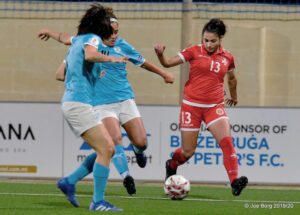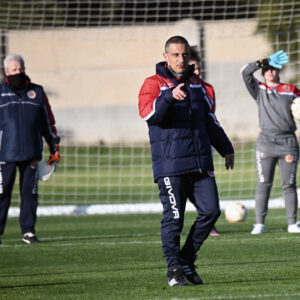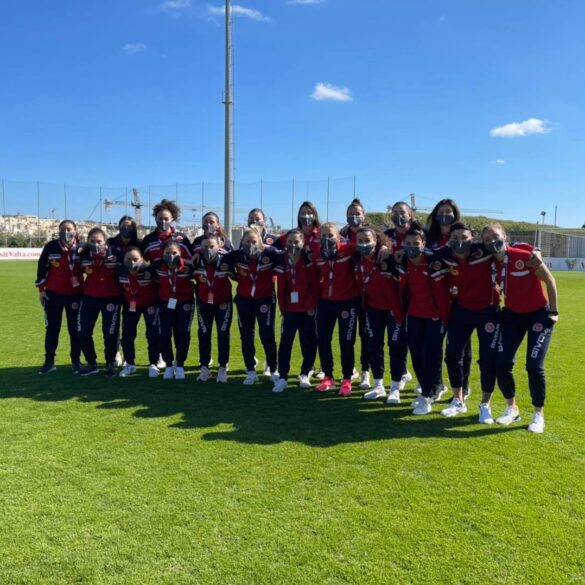“I’ve been having sleepless nights since I found out,” laughed Mark Gatt, head coach of the Malta National Team, a position he has held since 2015.
Gatt is referring to next week’s friendly against World Cup bronze medalists Sweden, part of the new Visit Malta Tournament the island is hosting this week — Slovakia and Austria are the other teams involved — in another breakthrough for an evolving and thriving nation of just half a million people.
“It shows our progress, but how should I put it? It’s comforting knowing we are doing a good job and gradually climbing the ladder, but we have to be realistic. If we improve from game to game, that’s my goal, I’m happy with that.
“Sweden is Sweden, it’s going to be interesting, and Slovakia are a good team, probably somewhere in between. For us, it’s like being in a Formula 3 car going into Formula 2 and then straight into Formula 1.”
Malta’s progress has been remarkable for what they have. Two away wins to Georgia and Israel in Euro 2021 qualifying late last year propelled the team up 16 places in the FIFA rankings, making it the biggest mover up to 85th and into the top 100. So what’s the secret for a nation with less than half a million inhabitants?
“We had our first player going abroad originally, which was Rachel [Cuschieri], who went to Cyprus [in 2014]. She opened the door for many young girls to follow her,” said Gatt. “What had a really huge impact was the MFA Academy, which opened around eight years ago, give or take.
“The best players on the island are chosen to go to school together, it’s a really special school for top athletes. The first year we had four girls playing with the boys. From that, Nicole [Sciberras] is at Juventus, Maria [Farrugia] is at Sunderland, and Haley [Bugeja] is at Sassuolo and has been a really big hit.”
He added: “It’s a combination. Having the sport school, having players going and playing in leagues abroad —making sure the players are technically getting better. There is room for development in the league here, the tempo at national team level is much stronger and much more physically demanding.”
Malta’s Rising Stars

England-based Maria Farrugia had it more difficult than most given she was born away from the main island that houses the capital city of Valletta and the MFA Academy, meaning for several years the attacking midfielder had to take a ferry back and forth from her home on the smaller island of Gozo, which has a population of just 30,000.
“I started at a really young age, I think I was only four years old,” said Farrugia. “I had an older brother who played and I joined his team and never looked back.
“I was always the only girl, I played with them all the way until under-15s level. When I was 11, I was selected to join the Academy, which meant I could pursue a career in football and continue my education. It helped me a lot physically and even technically playing with the boys because you have to think really fast.”
For five years, Farrugia would get up at 5 a.m., be driven to the ferry terminal by her parents and take the 20-minute boat to the main island before jumping on a bus to the school where she would arrive at around 7:30 a.m.
Her day generally ended at 2:30 p.m., but if she had training or games in the evening, sometimes she wouldn’t arrive on the return ferry back in Gozo until 11 p.m., but she believes all the sacrifices have been worthwhile now that she is playing for Sunderland and her national team.
“Of course,” she said. “I knew they would pay off like they did and now I’m playing for a great team in Sunderland and for my national team.”
Haley Bugeja’s story is similar in that she also had an older brother who played, and also grew up in Malta with a burning passion for football.
“I was five and my older brother had tried to talk my mum into me going to train with his club,” the teenager said. “I had grown up in a family that would watch a lot of football on TV and we would always go and watch my brother play, so I really grew into it.
“I was lucky to have the opportunity to train with the boys for over six years and that helped me a lot in my development. I started training at the MFA at 12 years old and they had put me in an older age group. If I’m honest, I found it difficult the first year as I was still very shy, but from then on I started to feel more comfortable.”
Gatt added: “You can understand the sacrifices these girls make,” when discussing Farrugia and Bugeja, the latter of whom has made a name for herself as a superstar at just 16.

In the team’s 4–0 win at Georgia in November, Bugeja scored a hat trick and has shown impressive form in Italy with Sassuolo, scoring two in her Serie A debut against Napoli and four goals in her first four games.
Her hat trick against Georgia made her the youngest player to score a hat trick in a UEFA match, breaking a 23-year-old record set by Scotland’s Julie Fleeting in 1997, and Gatt tells the story of how he first became aware of Malta’s brightest young star.
“I first saw Haley in our academy and I had never seen her before,” he recalled. “She was only 12, but her moves and her talent, I said, ‘This girl is really something.’ I said we needed to push her higher than the under-12s.
“When she was 14, she was playing with her local senior team and her team made it to a cup final. The coach trusted her to play and she was actually given the chance to score the winner. I said, ‘Wow, this girl is 14 and has the courage to go and take this penalty in the last minute.’ Her team had never won the cup and she missed, so I called her the next day and told her that I knew she’d be disappointed, but to have the guts to take that penalty was something special and I offered her the chance to train with us. We were careful not to burn her out, but she was the top scorer in the league two years in a row at 14 and 15, can you imagine that? I tell her to dream big, always dream big.”
Recalling the same experience herself, Bugeja recalled, “It was the hardest football-related experience I had experienced at the time. It was something I had to overcome and the next morning I received that phone call from Mark and he explained to me that he admired my attitude and passion to step up at 14 years old in only my second senior game, which happened to be a cup final.
“That experience was definitely tough, but I could really see from even the next morning that it was going to open more doors for me to grow and develop.”
Gatt says he would always encourage his young players to follow in the footsteps of both Farrugia and Bugeja and spend their youth days playing with boys, and isn’t surprised both have made moves abroad in the last couple of years.
“You knew Maria was going to make it. She would take the mickey out of the boys she played with. You could see it in her, it was no surprise we called her up for the national team. Moving to England was an important moment for her, we see a really bright future for her.
“I brought Haley into train when she was 14, her talent was always clear. We couldn’t use her until she was 16, but we never wanted to put too much pressure on her.”
Balancing Homegrown Players and Those Playing Abroad
Gatt is now embarking on the most exciting part of his six years in charge so far and has a mixture of experienced players and exciting youngsters, as well as a good mix of players who are now playing abroad, while drafting in others such as former Manchester City defender Emma Lipman who now represents the national team.
“To get Emma Lipman was a big bonus. We are a small island, so if we can find other players to play for us then we embrace that.”
It’s fair to say Gatt probably never imagined he would be facing off with the World Cup bronze medalists when he took up the job, but his desire to bring through the nation’s young talent has both motivated his desire to work in the women’s game and helped him build a competitive side.
The former head coach, Pierre Brincat, who Gatt describes as the “godfather of women’s football,” is his long-term friend, 5-a-side teammate, and former colleague at a local airline, and it was that relationship which brought about Gatt’s move into the women’s game after ending his own playing career.
“Pierre knew I was coaching and he told me there was a women’s football team who needed a coach and was I interested? I said, ‘Let’s give it a try,’ and when I went I was hooked.
“When I saw myself in the future and asked myself, ‘What will happen in five or ten years, where are we going to get the players from?’ We did an event for young girls who wanted to play football and about 40 girls came. I took about 30 and continued with them, that’s basically what the national team was made up of two years later, from 16 onwards we just worked with them.”
Gatt admits he realistically only has around 40 players to choose from, with the local national league still amateur and an ever-increasing variation between the quality of those remaining at home and those going professional in leagues overseas.
“Most of the national team players could play abroad and get paid if they wanted to, but some prefer to stay here,” he said. “The toughest part I find bringing them together is the ones here can train a week before, but those coming back we only meet three days before, but I would always prefer it that way. It’s difficult, but being in those leagues they are physically and mentally improving, so I prefer it that way, it just makes the organization side of things more difficult.”
When his side faced Slovakia on Thursday, players such as Farrugia and Bugeja will probably have only trained on the Tuesday and Wednesday, which Gatt describes as a “headache,” but hopes his key players will be in better shape for the tougher encounter with Sweden next Tuesday.
He also appreciates the continued sacrifices his players in Malta make given all of them work full-time around football and play in the evenings, while Gatt himself is also employed in the Malta FA’s marketing department when he’s not on national team camps.
“It’s very hard for them. We have quite a few university students. We have physiotherapists, secretaries, factory workers, everything. They train every day after work, they get home late. The league games here are Tuesday and Wednesday at 8:30 p.m., after a long day of work, then they get home at midnight and go to work the next day. They’re not doing it for money, they do it because they love the game.

“I can’t complain with what we have, it’s a professional setup. I have nine people working with me. I have an assistant, a goalkeeper coach, physio, doctor, masseur, PR manager, the team manager, Pierre is still involved. We have the same equipment, same ground as the men’s team. Our last two games in Georgia and Israel, the association sent us on charter flights both times.”
There’s no doubt the amount of players moving abroad has helped Gatt’s team rise up the rankings, but Farrugia is one of only two in the current squad who has done so not in Italy.
Farrugia moved to England almost a decade ago with her family and joined an academy, where several players would be chosen to go and represent Sunderland at the end of the season.
“I had trials,” recalled the 20-year-old. “I kept in contact with their coaches and when I finished my GCSEs they offered me a scholarship where I continued my studies at the Sunderland foundation and could play for Sunderland.
“When I first joined, I couldn’t play because of the age restrictions, but they were in the FA WSL and had a good team, and I did train with the first team sometimes.”
Since Sunderland dropped out of the FA WSL in 2018, Farrugia has become a regular in the FA Women’s National League, scoring goals from midfield and blossoming as one of the most exciting players in Melanie Reay’s squad.
Outside of football, Farrugia is into the second year of a sports science degree at Northumbria University, but she’s excited about the prospect of facing one of the top national teams back home this week.
“Sweden is a strong team, we know that, but hopefully our hard work pays off. It’s world-class players, it’s exciting. It’s a credit to all the team and staff involved for their hard work for us to have come this far.
“I think more players going abroad is helping because their level is improving and that naturally improves the team. I think the level in Malta is improving too, but I think the hard work and dedication the whole team is putting in is finally paying off.”
Bugeja also admits she is “honored” to be representing her national team, despite being so young, and is in no doubt her move to Sassuolo last summer has already improved her as a player and as a person.
“The fact I had the opportunity to represent my country at 14 was just amazing,” she said. “A sense of pride was what I felt at the time and mentally it made me want it even more.
“It’s been so fulfilling so far,” she added of her time in Italy. “I’ve been here seven months now and I’ve gained a lot of experience and how football abroad works and I can only imagine there is so much more to it that I don’t know about yet. It was never going to be easy moving away from home, leaving my family and friends behind, but this has been my dream for some time and I was never going to let it pass me by.”
The next target now for Bugeja, Farrugia, Gatt and the rest of the squad is the qualifying campaign for the 2023 World Cup. While qualification for a major tournament may still be far away on the horizon, Gatt is more focused on ensuring his team can at least continue competing and improving to give them a chance.
“We can do it, but we need more help, because everyone else is improving too,” he said. “We are a small island, so let’s do the best we can do for a small island. We have to look to another eight years in the future and my personal opinion is to encourage more young girls to play more mixed football.
“Some schools are doing that, but I’d love to see the girls given more respect. We have some really good young players and if we can keep identifying who these promising players are, keep them in our academy here, we start from the U-11s and for us as coaches, we need to keep improving too.”


